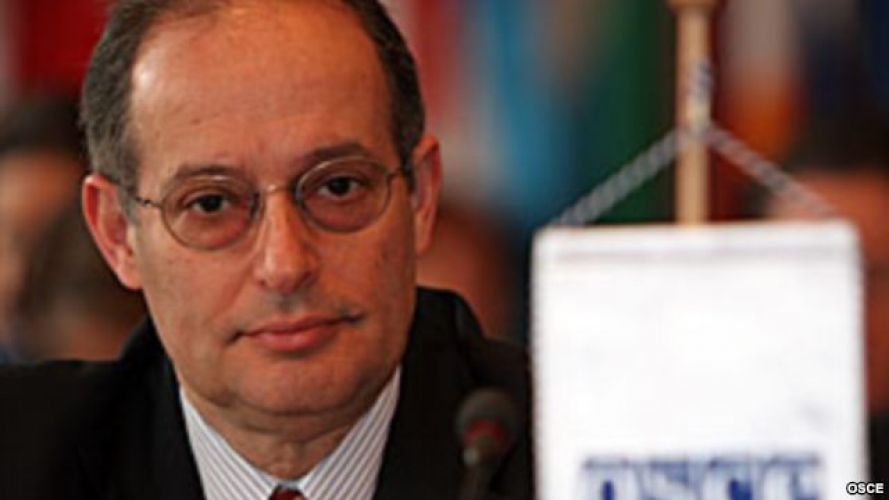During the meeting, the special rapporteur has submitted his fourth report.
“The oppressive government has not changed since the establishment of the mandate after the brutal crackdown on the post-election protest in December 2010”, – he said.
Miklós Haraszti said that the violations have continued even after the close of the Report and its submission in April.
“Several generations have grown up in Belarus, who do not know or have no experience of what the words pluralism, free artistic creation, free media, labor rights, free enterprise mean in reality,” said the UN Special Rapporteur.
“My findings underline that the current mandated level of scrutiny by the United Nations of compliance by Belarus with its human rights obligations must be maintained, especially in view of the forthcoming parliamentary elections. I reiterate my call towards the authorities to engage with the mandate,” – he concluded.
Mr. Haraszti concluded his statement by paying tribute to Belarusian civil organizations and human rights defenders, who “thankfully have endured and continued working in Belarus confronting the often forbidding environment”.
The country’s official representative, in turn, said that the Rapporteur’s report “does not reflect the realities of Belarus in an impartial and objective way”.
“Belarus responsibly works with the human rights structures under the United Nations. Our country has undergone the UPR twice, in 2010 and 2015. Currently, our government is adopting the country’s first national plan of action on implementation of the recommendations of the UPR and the treaty bodies, the idea of which appeared after President Lukashenka’s meeting with the UN High Commissioner for Human Rights last fall. This work has been carried out together with NGOs” he said.
“We have bilateral consultations ongoing with the USA and the European Union. There are no issues that Belarus would not be ready to discuss, including the death penalty and electoral legislation,” he said.
The speaker then concluded that the mandate should be “cancelled as unnecessary”.
The mandate of the Special Rapporteur on the situation of human rights in Belarus was introduced in 2012 in connection with the massive repressions in the country after the 2010 presidential elections. In response to this, the Belarusian Government said it does not recognize the mandate of the Special Rapporteur and will not interact with Mr. Haraszti.
 Human rights defenders continue to call for the mandate’s renewal
Human rights defenders continue to call for the mandate’s renewal
Amnesty International urges the members of the UN Human Rights Council to support the renewal of the mandate of Special Rapporteur on Belarus.The following is said in the human rights organization’s statement:
“The release of several prisoners convicted in politically motivated trials in 2015 and the role of Belarus in hosting mediation talks on the conflict in eastern Ukraine have led to an easing of relations with Belarus and the international community. This included, in October 2015, the EU suspending its longstanding sanctions against senior Belarusian officials, with the exception of four security officers believed to be linked to enforced disappearances of political activists in 1999 and 2000.
Such developments must not be allowed to eclipse the dire human rights situation in Belarus where the death penalty is retained and executions are carried out. The rights to freedom of peaceful assembly, association and expression are severely curtailed with legislation still in place to obstruct even the most basic enjoyment of these rights. State surveillance is a critical element in the authorities’ efforts to harass and intimidate civil society and independent media and serves to obstruct them from carrying out their legitimate activities. Lesbian, gay, bisexual, transgender and intersex (LGBTI) people face routine discrimination.”
Also, the statement highlights that in 2016 three people were sentenced to the death penalty in Belarus; another one, Siarhei Ivanou, was shot on the night of 18 May. Siarhei Ivanou was executed despite the fact that the UN Human Rights Committee had requested a stay of execution while it considered his case, in violation of Belarus’ obligations under the First Optional Protocol to the International Covenant for Civil and Political Rights (ICCPR). It was the eighth time since 2010 that Belarus has executed someone whose case was under consideration by the UN Human Rights Committee
“In light of the above and despite a shift from the international community towards Belarus politically, the fact remains that basic human rights and fundamental freedoms are violated systematically by the Belarusian authorities. The human rights community must invest all it can to protect the rights of the Belarusian people. The role of the Special Rapporteur in this regard is critical to secure rigorous monitoring of and reporting on the human rights situation in Belarus which is essential to ensuring accountability for human rights violations,” said Amnesty International in its statement.
Related articles
Bialiatski: “The Special Rapporteur is the only international monitoring mechanism we have”
Joint position of the human rights defenders ahead of the next round of the human rights dialogue
Belarusian human rights defenders announced the new political prisoner in the country





